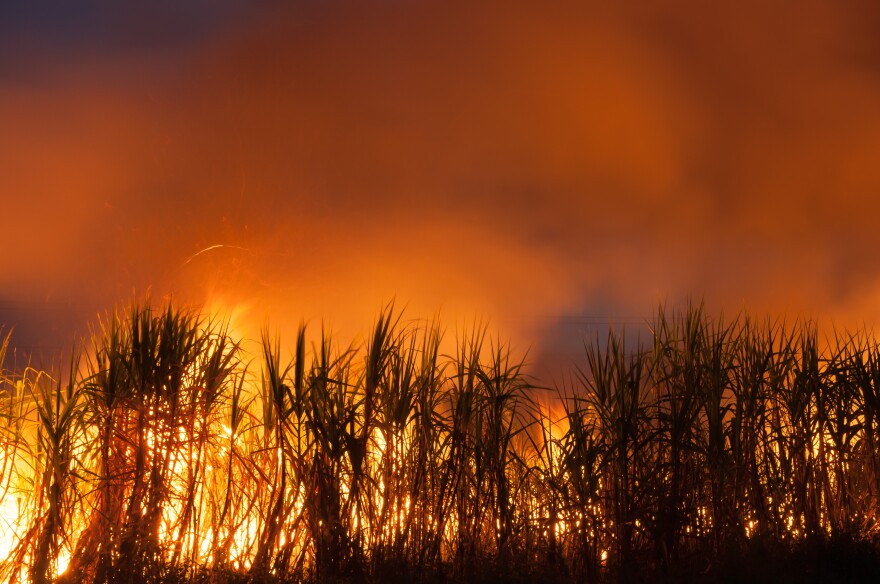Democratic lawmakers and South Florida community advocates are teaming up to oppose a bill that would make it harder to sue farms. They say proponents of the measure are using it as a cover to support sugarcane burning that adversely affects communities of color.
The measure would add "particle emissions" as a farming operation protected from lawsuits. The bill's sponsor Rep. Jayer Williamson (R-Pace), says he's chosen to put the phrase into his bill because that's a term people in the agricultural industry and those regulating that industry use. He points to the U.S. Environmental Protection Agency as an example.
"The EPA measures air quality in PM, which is particulate matter. So, a PM 2.5 would be things like dust, pollen, smoke, fumes, steam. When you look at a PM 10—is another thing—and that would be some of the larger items like grass, sawdust, and heavier particulate matter," Williamson says.
During a committee meeting on the bill, Rep. Omari Hardy (D-Mangonia) questioned Williamson about whether particle emissions could cover things that are carcinogenic. To which Williamson replied:
"That's a great question, and I don't know the answer to that question, so I'll be glad to look into that and get that answer for you."
Right now, there is a federal class-action lawsuit against Florida Crystals, the United States Sugar Corporation, and more that alleges the pre-harvest burning of sugarcane in South Florida releases pollutants that cause respiratory problems. Jessica McCarty is an assistant professor at the Miami University of Ohio. She's an expert in satellite data analysis for mapping fires, air pollutants, emissions that impact climate change, and agriculture and food security. She says smoke from biomass burning, like the burning of sugarcane leaves, can negatively impact people's health.
"They burn so much acreage, and then within the acreage, there's so much biomass on sugarcane, it's a tropical reed. It just has lots of leaves on it. So, there's just a lot of vegetation that can be burned," McCarty says.
McCarty says when all that vegetation is burned, it creates more particulate matter in the air. She says some of that matter can be seen, but others are smaller and not visible to the human eye and can pierce deeper into someone's lungs.
"So, when you breathe in the smoke or the hazy air caused by smoke, all that particulate matter 2.5, you're breathing it down deep, deep, deep into your lungs, and it stays there, and that can lead to other types of health impairments including people developing asthma and COPD," McCarty says.
Shanique Scott is the former Mayor of South Bay, a city in Palm Beach County. Scott says she's seen how sugarcane burning impacts people in her community.
"I own a dance studio here. A lot of my own dance students, I mean they struggle during the burning season with asthma, with respiratory problems," Scott says.
Scott says fires sometimes seem so close:
"Even the kids have come accustomed to telling their teachers to pull down the shades because, you know, it seems like the fields and the playground areas are on fire."
Scott says one year, a local school had to shut down due to the smoke:
"And they had to send a few of the students to the actual hospital."
She's now advocating for growers to stop burning sugarcane alongside Colin Walkes, the former mayor of Pahokee, another city in Palm Beach County. He says if the burning of sugarcane can harm people and damage property, then people should be able to go to the courts.
"Our legislators should not be picking the winner before the case is even heard," Walkes says.
If someone wants to bring a lawsuit against a farm, they would have to prove by clear and convincing evidence that the farm did not comply with state and federal environmental laws, regulations, or best management practices under Williamson's bill. Right now, Florida's Right to Farm Act only addresses nuisance claims, but Williamson's bill would expand that to all types of claims, including negligence, personal injury, and more.
Robert Mitchell is co-founder of Muck City Black Lives Matter, based in Belle Glade. He says communities of color like South Bay, Pahokee, and Belle Glade, are being impacted by sugarcane burning.
"However, when you look over to the East, where you have West Palm Beach, and Wellington and these areas over in that area, they actually have a provision when the wind is blowing to the East, they cannot burn. So, these more affluent communities are not—they're not near dealing with the impact that we're dealing directly," Mitchell says.
Williamson's proposal is heading to its last committee stop before heading to the floor for a vote.
Copyright 2021 WFSU. To see more, visit WFSU. 9(MDA4MzM1MjM1MDEzMTg5NTk0MzNmOTQ5MA004))

